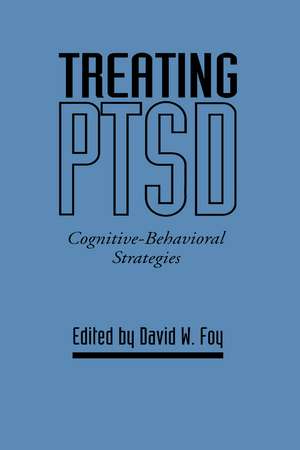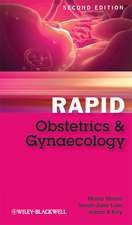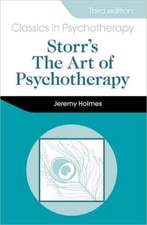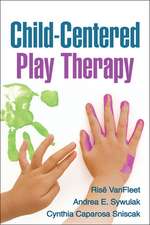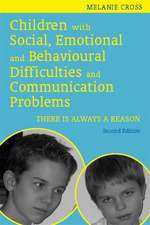Treating PTSD: Cognitive-Behavioral Strategies: Treatment Manuals for Practitioners
Editat de David W. Foyen Limba Engleză Paperback – 28 iul 1992
This book presents cognitive-behavioral treatment protocols for working with traumatized individuals and groups. While there are unique aspects to be considered for clinical work with survivors of different types of trauma, the volume demonstrates that that there are basic principles that can be applied across PTSD populations. Grounded in a unified conceptual model, behavioral strategies are outlined for assessing and treating combat veterans, battered women, and children and adults who have been sexually assaulted. In each chapter, specific assessment instruments that have proven useful are identified, and the applications of behavioral treatment methods are carefully described. Special features include a decision-making tree for guiding the process of diagnostic assessment in combat-related PTSD and a symptom checklist for monitoring changes in core PTSD symptoms over the course of therapy.
Preț: 211.47 lei
Preț vechi: 222.60 lei
-5% Nou
Puncte Express: 317
Preț estimativ în valută:
40.46€ • 42.36$ • 33.48£
40.46€ • 42.36$ • 33.48£
Carte tipărită la comandă
Livrare economică 05-19 aprilie
Preluare comenzi: 021 569.72.76
Specificații
ISBN-13: 9780898622201
ISBN-10: 0898622204
Pagini: 172
Dimensiuni: 152 x 229 x 15 mm
Greutate: 0.29 kg
Ediția:1
Editura: Guilford Publications
Colecția Guilford Press
Seria Treatment Manuals for Practitioners
ISBN-10: 0898622204
Pagini: 172
Dimensiuni: 152 x 229 x 15 mm
Greutate: 0.29 kg
Ediția:1
Editura: Guilford Publications
Colecția Guilford Press
Seria Treatment Manuals for Practitioners
Public țintă
Postgraduate, Professional, Professional Practice & Development, and UndergraduateCuprins
Foy, Introduction and Description of the Disorder. Sipprelle, A Vet Center Experience: Multievent Trauma, Delayed Treatment Type. Carroll, Foy, Assessment and Treatment of Combat-Related Post-Traumatic Stress Disorder in a Medical Center Setting. Dutton, Assessment and Treatment of Post-Traumatic Stress Disorder among Battered Women. Resnick, Newton, Assessment and Treatment of Post-Traumatic Stress Disorder in Adult Survivors of Sexual Assault. Lipovsky, Assessment and Treatment of Post-Traumatic Stress Disorder in Child Survivors of Sexual Assault. Index.
Notă biografică
David W. Foy, Fuller Theological Seminary and West Los Angeles Veterans Affairs Medical Center, Brentwood Division .
Recenzii
Blending years of experience with traumatized patients, the authors have provided us with an outstanding manual to guide us in the evaluation and treatment of PTSD. This book is must reading for all clinicians who treat trauma survivors; it is splendidly written, incisive, and informative.'' --Terence M. Keane, Ph.D., National Center for Post-Traumatic Stress Disorder
It (the book) is appropriate reading for all mental health professionals, since knowledge of this prevalent but still underdiagnosed disorder is relevant to most clinical settings. However, it is particularly geared to the interests of scientist-practitioner clinical psychologists, who desire to integrate research and practice.
TREATING PTSD is well-written, lucid in style, and generally substantive in content. C-B therapeutic strategies are clearly delineated with careful rationale outlined for each technique. The chapters dealing with combat veterans in particular convey empirically informed clinical wisdom....In summary, TREATING PTSD: COGNITIVE BEHAVIORAL STRATEGIES is an in-depth description of state-of-the-art behavioral and cognitive techniques utilized to reduce PTSD symptoms in certain trauma victims. Although framed within a C-B model, this book has broad applicability to all those working with PTSD sufferers, and these techniques can easily be translated into other theoretical frameworks. --Victor Molinari, Ph.D. and Tom Anderson, Ph.D., Veterans Affairs Medical Center, Psychology Service
It (the book) is appropriate reading for all mental health professionals, since knowledge of this prevalent but still underdiagnosed disorder is relevant to most clinical settings. However, it is particularly geared to the interests of scientist-practitioner clinical psychologists, who desire to integrate research and practice.
TREATING PTSD is well-written, lucid in style, and generally substantive in content. C-B therapeutic strategies are clearly delineated with careful rationale outlined for each technique. The chapters dealing with combat veterans in particular convey empirically informed clinical wisdom....In summary, TREATING PTSD: COGNITIVE BEHAVIORAL STRATEGIES is an in-depth description of state-of-the-art behavioral and cognitive techniques utilized to reduce PTSD symptoms in certain trauma victims. Although framed within a C-B model, this book has broad applicability to all those working with PTSD sufferers, and these techniques can easily be translated into other theoretical frameworks. --Victor Molinari, Ph.D. and Tom Anderson, Ph.D., Veterans Affairs Medical Center, Psychology Service
Dutton looks at PTSD in battered women where the potential stressor remains. While treatment is possible within a safe environment, any treatment plan must accommodate to the often present threat of repeat assault. The chapter contains an excellent discussion of such therapeutic issues. Resnick and Newton discuss working with adult survivors of sexual assault without quoting Jehu's work on the topic. Again, the value of detailed assessment combined with exposure, anxiety management, and cognitive restructuring are well illustrated. Lipovsky makes very good use of clinical examples in illustrating a comprehensive cognitive-behavioral approach to treating PTSD in child survivors of sexual assault. Overall, there is a coherence to this text that is often missing from edited books. The authors share a good understanding of cognitive-behavioral methods and apply this well to alleviate the suffering of the survivors of various traumas. --Professor William Yale, Institute of Psychiatry, London, Journal of Psychosomatic Research
Straightforward and concise....Will become a standard both for practicing clinicians and graduate students.
--Journal of Traumatic Stress, 4/26/1992ƒƒBlending years of experience with traumatized patients, the authors have provided us with an outstanding manual to guide us in the evaluation and treatment of PTSD. This book is must reading for all clinicians who treat trauma survivors; it is splendidly written, incisive, and informative.-Terence M. Keane, PhD, National Center for Post
--Traumatic Stress Disorder, 4/26/1992ƒƒ...provides readers with an opportunity to develop a solid understanding of the behavioral, cognitive, and psychodynamic models that form the basic foundation for the field of traumatic stress....An excellent addition to the growing literature on the nature, assessment, and treatment of traumatic stress. I strongly recommend it to both novice and experienced clinicians and researchers.
--Contemporary Psychology, 4/26/1992Descriere
The book's contributors have selected proven treatment protocols for post-traumatic stress disorder (PTSD) and present them as components of a unified conceptual model for cognitive-behavioral treatment.
